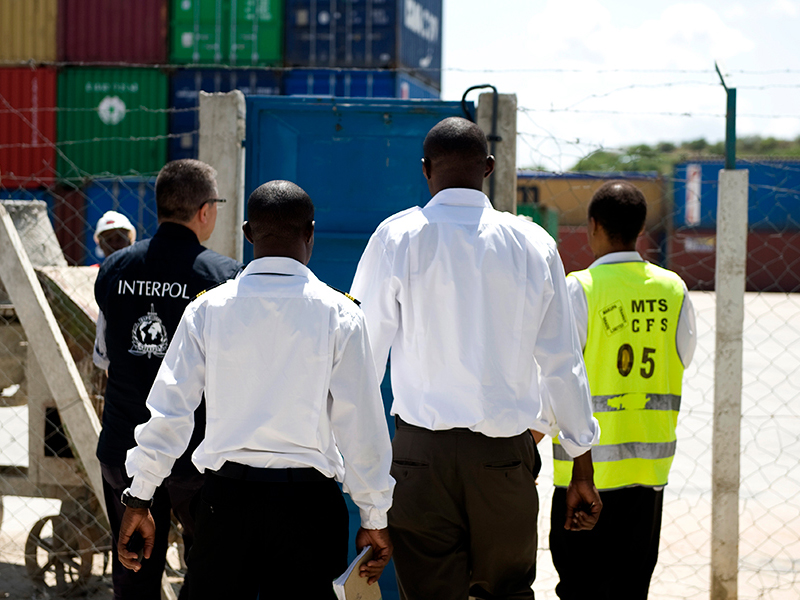Free for Law Enforcement
The IIPCIC programme of study for law enforcement consists of 5 online curriculums, industry-specific courses, pre-recorded webinars, podcasts and short courses. An IIPCIC certificate endorsed by INTERPOL is available to download after successful completion of each curriculum and industry-specific/short course. All police officers, customs officers, prosecutors, and regulatory body representatives can take the IIPCIC training without charge.
Are you interested in enrollment and have a law enforcement email address?
You may self-enroll using the 'Create Account' button:
Create AccountAre you from law enforcement but DO NOT have an official email address?
Please click the 'Request Course Access' button and fill out the form on our Course Enrollment Request page:
Request Course AccessThe Intellectual Property Rights Enforcement for Customs Officers online training series is developed and maintained by the International Intellectual Property Crime Investigators College (IIPCIC) with the assistance of the World Customs Organization (WCO). Developed by a team of transnational subject matter experts with deep experience in Customs enforcement of IP crimes, this eight-module series provides Customs officers from around the world with the knowledge they need to confidently approach the detection and interdiction of illicit goods crossing international borders.
This series covers important topics like the sharing of Customs best practices, international supply chain management, government agency cooperation, private sector partnerships, risk management, and legal proceedings in IPR cases. These topics and others serve to inform Customs officers and promote proven strategies for interdicting IP crime on an international stage.

This curriculum is currently available in English, Mandarin, Spanish and Arabic. Students must complete each module and pass the accompanying quiz with a score of 80% or better to complete the training and receive their downloadable certificate.
C1: The Importance of Intellectual Property Rights (IPR)
This module discusses the basic information every Customs officer needs to know about intellectual property (IP), intellectual property rights (IPR), and the impact of intellectual property rights violations on businesses, governments and consumers in terms of lost revenue, reduced employment, and risks to life and health. We will also talk about the obligation and opportunity Customs Administrations have to address the illicit trade of protected goods and introduce key terms associated with this field.
C2: A Brief History and Overview of IP and IPR
This module provides a broad overview and brief history of intellectual property (IP) and intellectual property rights (IPR) and the international agreements that provide Customs officers with the framework for border enforcement. We will also explain the various types of intellectual property and the steps both Customs and rights owners can take to ensure the greatest opportunity for success in detecting and interdicting illicit goods crossing international borders.
C3: The International Supply Chain and IPR
This module covers the basic principles of supply chain management and how they can be a critical tool in the fight against intellectual property violations. We will identify the key players and procedures involved in managing a secure supply chain. We will also discuss how these principles, when effectively applied by both Customs authorities and rights holders, can have a significant impact on mitigating the flow of counterfeit and pirated goods.
C4: The Critical Importance of Government Agency Cooperation in IPR Protection
This module outlines the basic principles of working in partnership with other enforcement groups and how this is the most effective way to tackle the growing IP crime problem. We will identify some critical partners in this effort including other law enforcement agencies, international government offices, and private investigation sources. We will also demonstrate that an effective campaign against IP crime relies on cooperation from many enforcement groups, not only at the physical border but also at local and regional markets. Finally, we will describe some of the more effective roles, responsibilities, and methodologies used in collaborative law enforcement relationships.
C5: Customs Partnership with IP Rights Holders
This module discusses the importance of working in partnership with intellectual property rights holders is essential in detecting, deterring, and stopping the flow of counterfeit products. We will demonstrate how sharing information and resources benefits both Customs authorities and rights holders, particularly in the identification of illicit goods. We will also show how these partnerships can prove productive and valuable when established on principles of mutual respect, good communication, and transparency. We will outline important principles related to maximizing financial resources and understanding applicable legal restrictions. And finally, we will discuss the importance of treating shared information, particularly proprietary information, with the greatest of care to ensure trade secrets are sufficiently protected.
C6: IPR Risk Management – A Critical Tool for Discovering IPR Violations
In this course, we will be discussing risk management and the critical role it plays in Customs border management. We will define risk management and targeting and discuss how these concepts are fundamental to building a risk-based approach to addressing IP theft and illicit trade. We will provide instruction on the process of conducting a risk assessment and outline key sources of information. Finally, we will discuss some of the analytical tools that can be used to facilitate the risk assessment process, including importer and exporter profiles.
C7: Customs Examination at the Border
In this course, we will be discussing the important work of conducting IP examinations at the border. We will begin by reviewing common IPR violations and the steps that can be taken to verify that an imported good has protected status. Next, we will review some of the tools available to Customs officers to assist in the examination process. We will also highlight some of the red flags that can alert Customs officers to potential IPR violations. Finally, we will talk about working with the rights owner and concluding an investigation.
C8: Customs Considerations for IPR Legal Proceedings
In this course, we will be discussing the legal aspects of IP crime, the punitive actions that can be taken against the IP criminal, and the disposition of infringing products. We will begin by reviewing IP law and the steps rights holders must take to secure protected status for their products. Next, we will discuss detention, seizure, evidence collection, and the remedies that can be used to address IPR violations. Finally, we will explain the options for the ultimate disposition of seized goods, including the forfeiture and destruction of infringing products.
On successful completion of the 8 modules, students are eligible to download an IIPCIC Certificate endorsed by INTERPOL certifying they have successfully completed the "Specialized Curriculum for Customs Officers on IPR Enforcement" online training series. The certificate course, recognized by INTERPOL, provides customs officers with evidence of specialist awareness and learning on the subject of the detection and interdiction of illicit goods crossing international borders.


This series aims to provide Customs officers from around the world with the knowledge they need to confidently approach the detection and interdiction of illicit goods crossing international borders.
I would like to thank IIPCIC for offering the courses free of charge to law enforcement agencies around the world. I am looking forward to seeing more courses added to the list.